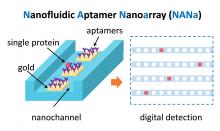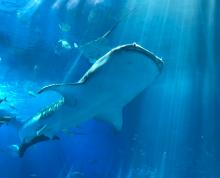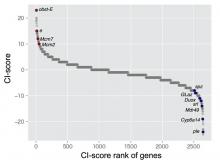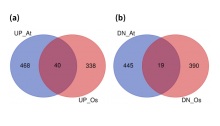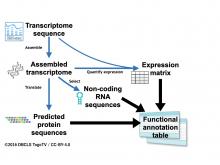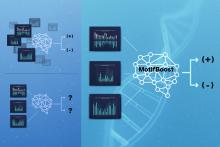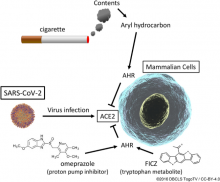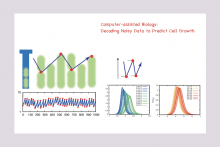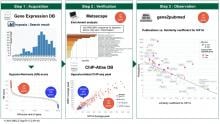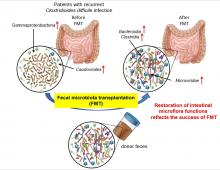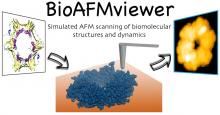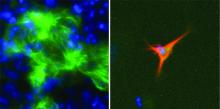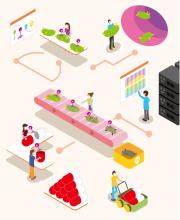Biology Bioinformatics
News
23 Jun 2023
An international team led by Professor Yan Xu from Osaka Metropolitan University has developed a groundbreaking nanofluidic device, named NANa, capable of stochastically capturing and digitally detecting individual proteins at cellular concentrations. This tool, vital for precision medicine, is designed to handle tiny volumes equivalent to a single cell's contents and can identify single biomolecules even in high-concentration environments. The team plans to conduct further demonstrations using actual cell samples and explore the integration of this tool with AI and biological big data. This research could potentially revolutionize personalized disease prevention and treatment.
28 Mar 2023
A group including Osaka Metropolitan University researchers discovered that the rhodopsin—a protein in the eye that detects light—of whale sharks has changed to efficiently detect blue light, which penetrates deep-sea water easily. The amino acid substitutions–one of which is counterintuitively associated with congenital stationary night blindness in humans—aid in detecting the low levels of light in the deep-sea. Although these changes make the whale shark rhodopsin less thermally stable the deep-sea temperature, allows their rhodopsin to keep working. This suggests that the unique adaptation evolved to function in the low-light low-temperature environment where whale sharks live.
11 Jan 2023
A team of Japanese researchers created a high-quality genome assembly of red perilla, a step toward harnessing the plant’s potentially useful bioactive chemicals — and its medicinal properties.
11 Dec 2022
Scientists investigate how genes in some insects can influence one another to change their expression depending on environmental conditions.
08 Sep 2022
Researchers at Hiroshima University are closer to identifying the molecular processes underlying how floods deprive plants of oxygen — and how to engineer hardier crops.
22 Jul 2022
Research team develops functional annotation workflow for genome sequencing of insects
20 Jul 2022
Researchers at the Institute of Industrial Science at The University of Tokyo introduce a machine learning method to help predict past infection from receptor sequences of immune T-cells even when little data is available, which may help improve human health and our understanding of adaptive immunity
21 Apr 2022
Genome profiling of Staphylococcus argenteus strains unveiled cross-contamination among Japanese retail foods and slaughterhouses.
16 Dec 2021
Researchers are closer to understanding potential common features of sources of oxidative stress observed in several diseases, from Parkinson’s disease to cancer.
05 Oct 2021
Researchers from DGIST explain how DNA is compacted to a million-times its full length in sperm cell nuclei
10 Sep 2021
Researchers have identified a potential reason why lower numbers of COVID cases have appeared amongst smokers compared to non-smokers, even as other reports suggest smoking increases severity of the disease.
08 Jul 2021
Researchers at The University of Tokyo Institute of Industrial Science use artificial intelligence to predict the size of cells over time without the need for simplifying assumptions, which may lead to a new understanding of microbiology principles and improved drug manufacturing from recombinant bacteria
09 Jun 2021
Publication bias, or the tendency of researchers and journals to not publish uninteresting findings, plagues much of the natural sciences and especially biomedical research. Hiroshima University researchers have developed a meta-analytic technique exploiting publicly available transcriptome databases that avoids the problem—and in so doing, discovered four genes previously unknown to be associated with responding to low-oxygen stress.
10 Feb 2021
In a study published in Gastroenterology – Researchers at Osaka City University and The Institute for Medical Science, The University of Tokyo, in collaboration with Brigham and Women's Hospital in Boston, report the intestinal bacterial and viral metagenome information from the fecal samples of patients with recurrent Clostridioides difficile infection (rCDI). This comprehensive analysis reveals the bacteria and phages involved in pathogenesis in rCDI, and their remarkable pathways important for the recovery of intestinal flora function.
22 Dec 2020
Atomic force microscopy (AFM) allows to obtain images and movies showing proteins at work, however with limited resolution. The developed BioAFMviewer software opens the opportunity to use the enormous amount of available high-resolution protein data to better understand experiments. Within an interactive interface with rich functionality, the BioAFMviewer computationally emulates tip-scanning of any biomolecular structure to generate simulated AFM graphics and movies. They greatly help in the interpretation of e.g., high-speed AFM observations.

12 Oct 2020
Scientists have estimated that the age of an individual does not indicate how likely they are to be infected by SARS-CoV-2. However, development of symptoms, progression of the disease, and mortality are age-dependent.
12 Oct 2020
Collaboration by researchers in Singapore and Australia lead to first-of-its-kind computational biology algorithm that could enable more effective cellular therapies against major diseases.
10 Jul 2020
Scientists demonstrate that the information about host bacteria–bacteriophage (phage) associations derived from world’s first metagenome analysis is useful for the development of phage therapies against intestinal pathobionts.
23 Feb 2020
South Korea's Ulsan National Institute of Science and Technology (UNIST), in collaboration with POSTECH, have developed a new biomimetic ‘moving’ surface, inspired from the biomachanics of the pectoral fins of the Batoidea.
06 Dec 2019
Scientists in Korea find a protein that mediates the interaction between the cellular systems involved in rapid responses against foreign genes in plants
Events
Sorry, nothing coming up for this discipline
Researchers
Sorry, nothing coming up for this discipline
Giants in history
Sorry, nothing coming up for this discipline



